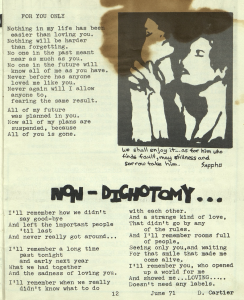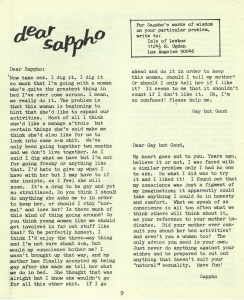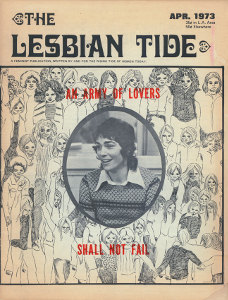The Lesbian Tide, a feminist periodical that remained in circulation from 1971 until 1980, began as a bulletin written by the Los Angeles chapter of the prominent lesbian rights organization Daughters of Bilitis and was initially entitled the LA DOB Newsletter (Clendinen and Nagourney 164). After expanding beyond Los Angeles and becoming the first ever national lesbian periodical (as well as the first American magazine with a title including the word “lesbian”), the staff organized the West Coast Lesbian Conference in 1973 (Clendinen and Nagourney 164).

D. Cartier’s poetry, featured in the inaugural issue of The Lesbian Tide
The periodical’s inaugural issue featured a wide range of content, including opinion pieces, “Gay Community News,” Daughters of Bilitis monthly activities, and artwork. Notably, two poems by “D. Cartier” accompany a black-and-white romantic drawing of two women captioned with a Sappho fragment:
“We shall enjoy it . . . as for him who finds fault, may stillness and sorrow take him.”
The two poems by D. Cartier, entitled “For You Only” and “Non-Dichotomy,” both contain themes of loss. “For You Only” laments a lost love, its opening lines reading, “Nothing in my life has been easier than loving you / Nothing will be harder than forgetting” (Cartier 12). “Non-Dichotomy” is less mournful, expressing gratitude for a past relationship despite sorrow that it has ended: “I’ll remember you, who opened up a world for me / And showed me . . . LOVING . . . / Doesn’t need any labels” (Cartier 12). The effect of placing these two poems together on a page with the illustration of two women in a passionate embrace creates a strong sense of the intensity of the romantic love that can exist between women. Sappho’s fragment ties all elements of this page together—that despite the heartbreak, trials, and tribulations that will exist amongst any lovers, love between women can be as beautiful and powerful as ever.

A snapshot of the “Dear Sappho” column – from Vol. 1 Issue 8 of The Lesbian Tide
As The Lesbian Tide continued to circulate throughout the 1970s, the editors developed an advice column entitled “Dear Sappho.” Readers could write with queries, worries, or musings addressed to “Isle of Lesbos, 1124 ½ North Ogden, Los Angeles” and receive a response from “Sappho,” an editor of the magazine. Topics ranged from relationship issues to sexual queries to worries about coming out. “Dear Sappho” continued as a way for editors of the periodical to connect with their audience until 1980, when The Lesbian Tide ceased publication due to financial struggles.

The April 1973 issue of The Lesbian Tide, featuring a quote from Rita Mae Brown’s “Sappho’s Reply” on the cover page.
Works Cited:
Clendinen, Dudley, and Adam Nagourney. Out For Good: The Struggle to Build a Gay Rights Movement in America. Simon & Schuster, 2016, p. 164.
Cartier. “For You Only.” The Lesbian Tide, vol. 1, no. 1, Tide Publications, Aug. 1971, p. 12, https://jstor.org/stable/community.28039236.
Cartier. “Non-Dichotomy.” The Lesbian Tide, vol. 1, no. 1, Tide Publications, Aug. 1971, p. 12, https://jstor.org/stable/community.28039236.
Deeni, et al. “The Lesbian Tide.” The Lesbian Tide, vol. 1, no. 1, Tide Publications, Aug. 1971, https://jstor.org/stable/community.28039236.
Julie Lee, et al. “The Lesbian Tide.” The Lesbian Tide, vol. 1, no. 8, Tide Publications, Mar. 1972, p. 9, https://jstor.org/stable/community.28039242.
